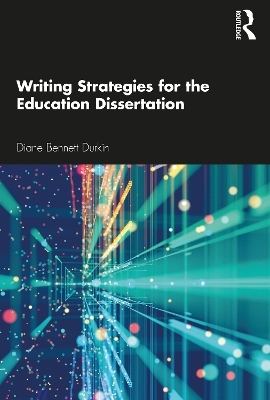
Writing Strategies for the Education Dissertation
Seiten
2020
Routledge (Verlag)
978-0-367-62705-8 (ISBN)
Routledge (Verlag)
978-0-367-62705-8 (ISBN)
This book focuses on best practice in writing for the Education dissertation. It concentrates on the processes of writing as thinking. These processes account for the very necessary uncertainty, decision-making, brainstorming, draft writing, and revision experiences when one writes about something new.
Writing Strategies for the Education Dissertation offers a unique take on doctoral writing. It uses composition and rhetoric strategies to identify key activities for generating thought to keep students writing. It de-mythologizes the view of writing as a mere skill and promotes the view of writing as thinking.
It uses writing to help students invent, think through, write, rethink, and rewrite as they develop and present their innovations. The book opens with this mindset and with the purposes of the task (adding to knowledge); it helps define a "researchable topic," and provides advice on invention ("brainstorming"). It then addresses each of the key sections of the dissertation, from Problem Statement, through Literature Review and Methods, to Findings and Conclusions, while underscoring the iterative nature of this writing. For each chapter, the book provides advice on invention, argument, and arrangement ("organization") – rhetorical elements that are seldom fully addressed in textbooks. Each chapter also looks at possible missteps, offers examples of student writing and revisions, and suggests alternatives, not rules. The text concludes with an inventive approach of its own, addressing style (clarity, economy, and coherence) as persuasion.
This book is suitable for all doctoral students of education and others looking for tips and advice on the best dissertation writing.
Writing Strategies for the Education Dissertation offers a unique take on doctoral writing. It uses composition and rhetoric strategies to identify key activities for generating thought to keep students writing. It de-mythologizes the view of writing as a mere skill and promotes the view of writing as thinking.
It uses writing to help students invent, think through, write, rethink, and rewrite as they develop and present their innovations. The book opens with this mindset and with the purposes of the task (adding to knowledge); it helps define a "researchable topic," and provides advice on invention ("brainstorming"). It then addresses each of the key sections of the dissertation, from Problem Statement, through Literature Review and Methods, to Findings and Conclusions, while underscoring the iterative nature of this writing. For each chapter, the book provides advice on invention, argument, and arrangement ("organization") – rhetorical elements that are seldom fully addressed in textbooks. Each chapter also looks at possible missteps, offers examples of student writing and revisions, and suggests alternatives, not rules. The text concludes with an inventive approach of its own, addressing style (clarity, economy, and coherence) as persuasion.
This book is suitable for all doctoral students of education and others looking for tips and advice on the best dissertation writing.
Diane Bennett Durkin has taught critical thinking and writing at UCLA for over 30 years, publishing textbooks that merge disciplines, and helping education doctoral students understand and use writing processes to generate, organize, and communicate their ideas.
1. De-mythologizing the Process: Changing One’s Mindset 2. The Problem Statement: Writing Processes 3. Writing Strategies for the Literature Review 4. Writing the Methods Chapter, Getting Past Preliminary Orals, and Getting Started 5. Collecting and Analyzing Data, then Writing up Results and Findings 6. Writing up the Discussion: Conclusions and Recommendations 7. Revising the Dissertation as a Whole
| Erscheinungsdatum | 15.01.2021 |
|---|---|
| Verlagsort | London |
| Sprache | englisch |
| Maße | 156 x 234 mm |
| Gewicht | 290 g |
| Themenwelt | Sozialwissenschaften ► Pädagogik ► Allgemeines / Lexika |
| Sozialwissenschaften ► Pädagogik ► Bildungstheorie | |
| Sozialwissenschaften ► Pädagogik ► Erwachsenenbildung | |
| ISBN-10 | 0-367-62705-1 / 0367627051 |
| ISBN-13 | 978-0-367-62705-8 / 9780367627058 |
| Zustand | Neuware |
| Haben Sie eine Frage zum Produkt? |
Mehr entdecken
aus dem Bereich
aus dem Bereich
Eine neues Menschsein für die Welt von morgen
Buch | Softcover (2023)
Vahlen (Verlag)
24,90 €
Einführung in die Theorie transformatorischer Bildungsprozesse
Buch | Softcover (2023)
Kohlhammer (Verlag)
34,00 €


